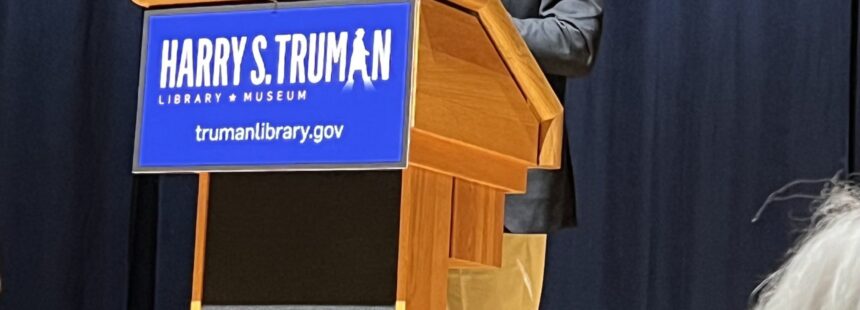

By Mike Genet
The following article is a reprint. You can read the original at The Examiner.
“By Mike Genet
mike.genet@examiner.net
Garry Kasparov says he felt especially honored to speak Thursday at the Truman Presidential Library in Independence because his father in the post-Stalin Soviet Union named him after Harry Truman, in admiration for what he saw as the president’s stand against communism.
The Russian language and spelling lead to a G instead of H, as well as the “hard G” sound, the chess grandmaster explained, and it was a rare name in the country “until Harry Potter came along.”
Moreover, Kasparov said,cha the type of global leadership Truman displayed with events such as the Berlin Airlift, which started 75 years ago this month to counter Stalin’s blockade of the German city, is required now amid Russia’s war against Ukraine.
“The world desperately needs people like him,” said Kasparov, 60, who became the youngest world chess champion at age 22 and fled Russia in 2013 after his pro-democratic opposition to Vladimir Putin put him and his family in danger. “We need bold thinking like that.”
Whereas some leaders would look at what can and cannot be done, he said, “Truman saw what needed to be done, and how we can do it.
“It’s still hard to believe, 75 years later,” Kasparov said of the logistics involved with the Berlin Airlift, “and now we have a supply-chain issue every time a ship gets stuck in a canal.”
June 26 marks the 75th anniversary of the Berlin Airlift, which helped save people in the city’s areas controlled by the U.S., Britain and France after World War II. Soviet leaders, upset at plans to create a unified West German state from the other three occupation zones, had blockaded road, rail and water routes into Berlin’s Western-controlled areas a couple days earlier, cutting off supplies. Berlin was in the Soviet zone of Germany, but post-war allied agreements had left that city for divided occupancy.
According to the U.S. Department of Defense, the airlift brought 2.3 million tons of supplies to the city through 278,000 air drops, which continued through September 1949 – four months after the Soviets relented and ended their 11-month blockade.
Now, Ukraine is the current battlefield of good and evil, Kasparov said, and as “clear cut” a difference between the two as he can imagine. He did not outright call for greatly increased United States involvement to support Ukraine, but he was resolute that such support from the U.S. and other allies is vital and must continue. Ukraine joining NATO, he said, would only seem proper since NATO was formed during Truman’s presidency with the expressed purpose of deterring Russian aggression.
“Ukraine is fighting the very war that NATO was built for,” Kasparov said, adding, “Do we want to live in a world where a dictator will think he can do whatever he wants, because he has nukes?”
While Ukraine is the battlefield, he said, the war will not necessarily end in Ukraine, not with China watching and possibly contemplating moves based on what happens. Also, it is not a war that can end purely at the negotiating table.
“Just as there are good wars and bad wars, there is a difference between a good peace and a bad peace,” Kasparov said, citing Hitler at Munich in the late 1930s as an example. “The price of stopping a dictator goes up with every delay. Isolation is the alternative to engagement that only fuels more aggression.”
Because of decisions such as the Berlin Airlift, the Marshall Plan to help rebuild Europe after World War II, NATO’s formation and droppimg atomic bombs to end World War II, Kasparov said, “Stalin never had reason to doubt Truman’s resolve.”
Despite his affinity for chess and the strategy behind it, Kasparov said poker is probably a better analogy for political leaders, as one cannot easily reveal one’s position and must deal with the hands dealt at the time, and Truman was good at that card game for politics, he said.
The success of the Korean War comes from responding to communist aggression, he said, and “not dropping the third bomb” of letting General Douglas MacArthur invade China and instigating a much larger war that Stalin probably wanted.
“I wish now we had his talent in the western leaders of the last 20 years,” he said.
Kasparov said he believes President Biden shows a grasp of history in dealing more appropriately with authoritarian leaders better than his two predecessors. President Obama, he said, “thought you could declare peace with everyone” when it takes two sides to make peace. President Trump, on the other hand, “didn’t want to make peace with dictators; he wanted to be friends with them and be like them.”
Answering a question later, Kasparov said he is not just opposed to the Russian government, but against oppressive dictatorships anywhere, as he grew up under that oppression and can speak to the differences.
“Freedom is better, democracy is better, equality under the law is better,” he said.
Still, Kasparov said, his speech is not about “what Garry thinks,” but about what Truman would think.
“Truman would fight,” he said, “and fight to win.””

